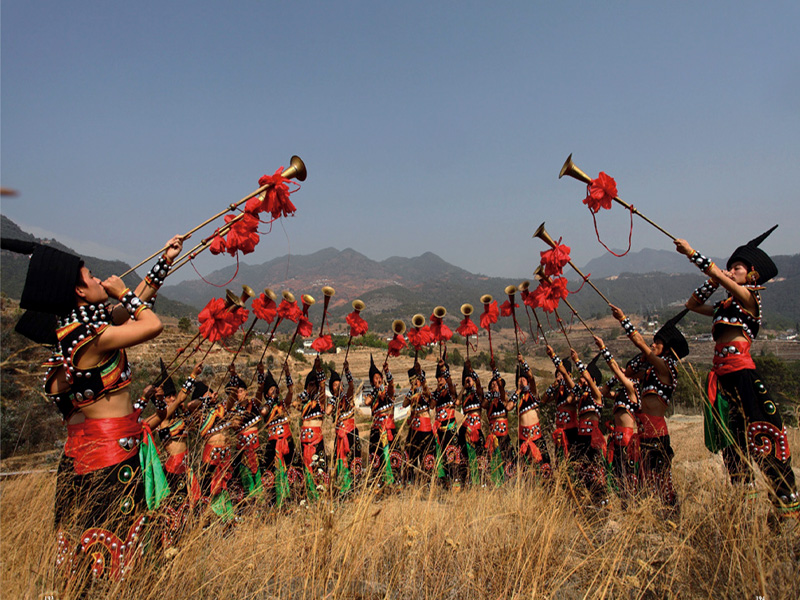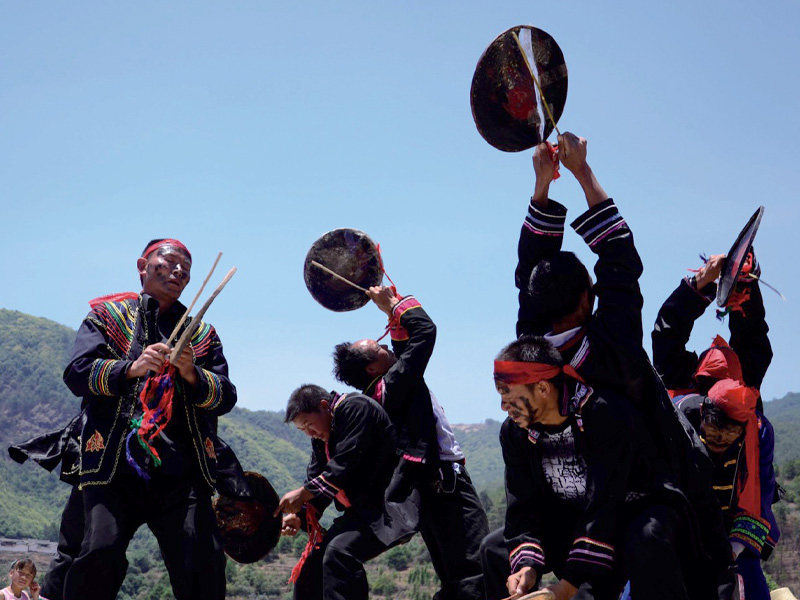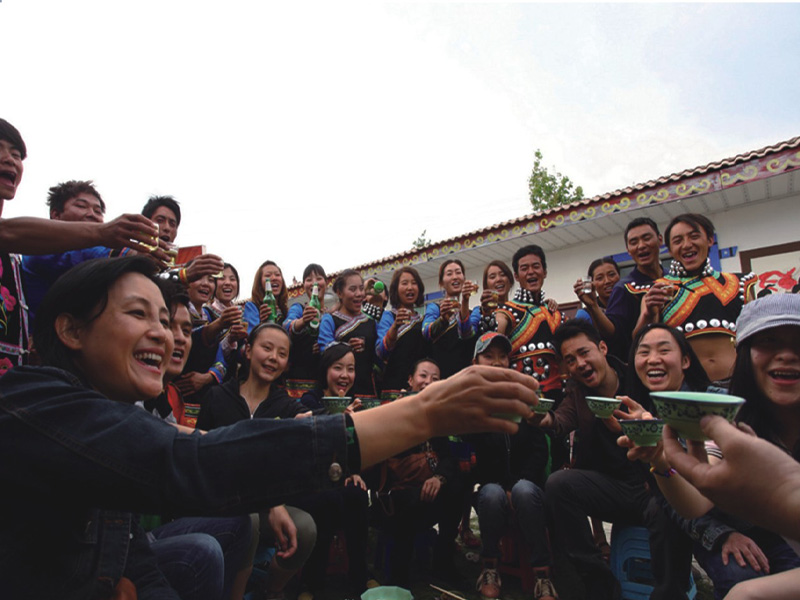Impression of ancient city
Baisha village
Release time:2021-07-27 18:07:43 Number of views:241次

Baisha village
On the third day of the third month of the lunar calendar, the couplet Festival; April 13 of the Gregorian calendar, Dai water sprinkling Festival; Before and after the Qingming Festival, the Dragon sacrifice ceremony; June 24 of the lunar calendar, Torch Festival; On the 16th of the twelfth lunar month, the year of the Yi nationality... If you happen to come to the meeting at these times. Be sure to come to Baisha village for a day or two, which will give you an unprecedented freshness. It is 47 kilometers from the county seat to Baisha village, xiaoheiqing town. The road condition is good. The path in the village is naturally covered with a layer of white sand. This is the origin of the village name. Baisha village is at the foot of Daheishan mountain, 3000 meters above sea level, not far from Meimei peak. The typical Sichuan Yunnan quadrangles blend harmoniously into the beautiful natural environment. Soma flowers bloom all over the mountains in April and may every year, which is also a good time to come to Baisha village. Most of the villagers in Baisha village are Yi people, most of whom are Yi people who moved in from Guizhou, as well as Yi people who moved in from Dali and Chuxiong in Yunnan and Liangshan Yi people who moved in from Zhaojue. If you pay attention to their clothes, you will know where their ancestors came from. The Yi people in Liangshan like to wear pleated skirts, chaerwa and wrap their heads with green cloth. The Yi people from Yunnan are wearing leggings, embroidered aprons and embroidered vests.

[Torch Festival]
Torch Festival is the most grand festival for Yi people, with three days of carnival. Welcome the fire on the first day and praise the fire on the second day. The third day sent the fire. Every family has prepared Tuotuo meat, buckwheat bread, zaoba noodles and homemade wine. Costumes come together from all directions. During the day, horse racing, wrestling, singing, beauty pageant,... Next to the night, people light torches made of dried pine, pine seeds or Artemisia sticks, first shine on every corner of the house, then go to the corner of the field, walk all over the mountains and fields, and use the fire to drive away the disease and disaster. There are walking fire dragons on the mountains around. Finally, all the torches gather together. People sing and dance around the campfire until dawn. When the campfire was about to go out, a pair of affectionate men and women moved the Yueqin under the yellow oil umbrella, played the harmonica and told their hearts.
[year of Yi nationality]
In the year of the Yi nationality, which began on the 16th of the twelfth lunar month, every family had a big banquet for three days. The first day is "Kushi", "Kushi" is "year", and "Shi" is "new". On this day, every family has to kill pigs. The pigs in the elder's family are killed first and come one by one in order. After killing the pig, offer Zuling, and then have new year's dinner. "Accompany" or "vigil" at night; The next day is "duobo". People wear costumes to pay New Year's greetings to each other. Each family treats guests with Tuotuo meat and bowls of wine. They are not allowed to go if they don't eat and drink well. The boys raced and wrestled, and the girls sang and danced. It was very lively. The third day is "Boji", and each family should carefully prepare meals. Cai sent his ancestors, and the whole family ate the new year's dinner together, hoping for a good harvest in the coming year. At dawn the next day, women married from other places in the village will take their dolls, carry the pig head of the previous year and go back to their mother's house to pay New Year's greetings.
[folk song and hoof and foot dance]
Yi people like to express their feelings with folk songs, whether they work in the mountains and fields or have weddings and funerals at home. Watching the mountains sing the forest, the trees sing the flowers, the fields sing the grain, the rivers sing the water, and the people sing the love. Men, women, old and young are all masters of duels. Singing the right song and dancing the right foot are the best ways for young men and women to express their feelings. He can't sing or dance. He may not even find an object. If a girl likes a boy, she opens her throat and sings, "sing, sing a folk song and pass it on." The boy couldn't get it, so he immediately responded: "every ditch, every rock, every ditch can't get through. As long as the younger sister has a heart, the younger brother will carry you through the ditch ". According to the old people in Baisha village, many of their "old fruits" have their daughters-in-law "singing". Everyone can dance in Baisha village. One or two people are accompanied by flutes. Men, women, old and young hold hands and dance in a circle around the campfire. A few people can jump, and hundreds of dry people can jump. Guests came to the village. They gathered in the village dance hall and lit a bonfire. Sing and dance until dawn“ Needless to say with your mouth, "when you get close, your feet will itch when you hear the sound of the flute."“ From morning to dusk, I can see only yellow and gray without feet. This is their love of foot dance expressed in their own lyrics. Foot practice dance has different dancing methods, such as "back pressing", "rubbing your feet", "fit your feet and flash a board", "chasing birds", which are dazzling, complex and changeable. Now the foot dance has already jumped out of Baisha and Huili, participated in many large-scale performances and won countless honors.
[Yi trombone suona]
The trombone is a copper wind instrument with a length of 1.7 meters. In the performance, it often cooperates with the copper suona, mostly with large syllable progression, while the suona is good at jumping rhythm: one is high and vigorous, the other is cheerful and loud; One long and one short complement each other. The Yi nationality trombone suona is popular in the south of Huili County. It has a history of more than 600 years. It is passed on from elders to younger generations in the family. Today, it has become a leader in Huili folk music.
[hospitality wine]
The hospitality wine in Baisha village should be drunk three times. Roadblock wine, banquet wine, farewell wine. Wine is not the point, song is the point. As soon as the guests arrived at the entrance of the village, the welcoming people offered a bowl full of wine and said, "when you come to Baisha village, the mountains and rivers are full of laughter. Please drink a bowl of sweet rice wine, a bowl of rice wine and a heart. " When the guests arrive at home, the host prepares a sumptuous banquet, persuading and toasting while eating. Blessings and respects should be sung with lyrics. The host and guest sing in pairs. You come and I go. When the guest was leaving, the host tried his best to stay and sang, "different feet, different roads, different homes and different guests. Words are different, songs are the same, wine is different, feelings are the same. Don't forget, friends, drink wine again.
[chaff and oil impact]
When visiting Baisha village, don't be surprised if several heterosexuals suddenly grab your hands and feet and swing back and forth like dangqiugan. They don't attack you, they just want to express their love for you. This game is called sifting chaff. The guests are men, and those who sift you must be women, and vice versa. When a handsome man who is screened is flying in the air, his head will hit a soft woven cotton thing. It must be the hip of a beautiful woman. This is hitting oil. The more times you are screened, the more you are liked by the opposite sex. In the view of Baisha people, the head is the sky and the hip is the ground. Hitting the hip with the head means harmony between heaven and earth. Obviously, it also contains the meaning of Yin-Yang harmony.
[Yafan Pengcai]
When you eat at the villagers' home in Baisha village, you will never finish the food in the bowl, because the host will continue to twist the food in your bowl, which is the local unique table culture. The host's doing so is a sign of hospitality. He hopes that the guests will be full and eat well. It is also an expression of confidence that the food tastes good. "The rice in Baisha village is watered by dew. The pigs in Baisha village grew up eating flowers ". They are also confident that they are rich at home. They have plenty of clothes and food, and they live a prosperous life.
[transportation and accommodation]
There is a direct bus from Huili tourism collection and release service center. You can also rent a car in the cultural square and charter a car for about 200 to 5300 yuan a day. There is also a gas charge. It only takes an hour to drive by yourself. - the wind is the best on the road. If you have time to stay for one night, it is recommended to enjoy Gesa farmhouse. You can also attend the fire party at the weekend.
